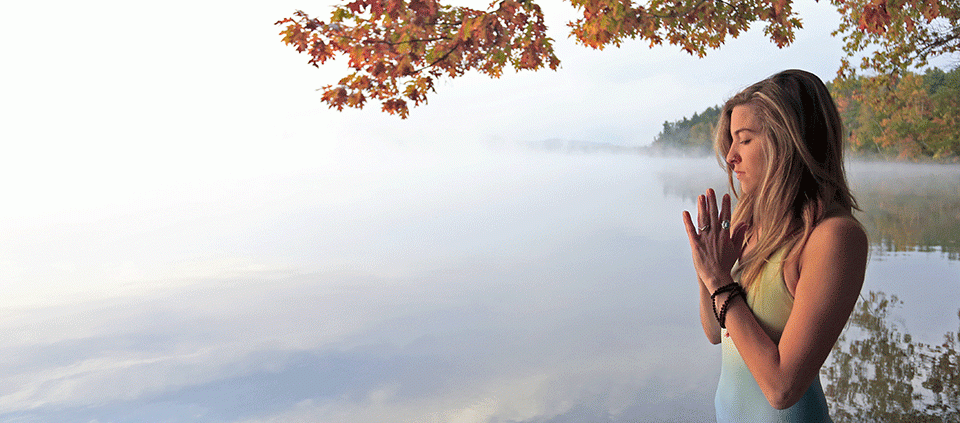Six Ayurvedic Tips for Staying Healthy this Fall

Autumn is upon us—and that means cold and flu viruses are lurking everywhere. How can you keep the bugs at bay? Sure, you can try the basics that many folks use: stay warm, perhaps schedule a flu shot, eat well. But you can also prevent colds and flu using ancient wisdom from yoga’s sister science, Ayurveda.
According to this holistic healing system, vata (ruled by the elements of air and ether) tends to increase in the fall. Often translated as “wind” or “that which moves,” vata’s qualities are cold, dry, light, mobile, and erratic. You can see these qualities manifesting outside: The leaves are getting brittle and dry, the temperatures are dropping (and fluctuating), and the wind is picking up speed.
According to Larissa Hall Carlson, Kripalu Schools faculty member and former Dean of the Kripalu School of Ayurveda, these changes also affect the body-mind. Here is her list of telltale signs that your vata dosha is gaining too much momentum:
- Dry lips, dry skin, dry nasal passages
- Constipation, gas, bloating
- Earaches, tinnitus
- Insomnia, disrupted sleep patterns
- Cold hands and feet, sensitivity to cold
- Feeling restless, depleted, weak
- Forgetfulness, trouble concentrating
- Hyperactivity (including excessive talking)
- Nervousness, anxiety, fearfulness.
Six Ways to Prevent Cold and Flu Naturally
Reduce stress. According to Larissa, “Ayurveda and allopathic medicine agree that stress can reduce the functioning of your immune system, leaving you vulnerable to illness.” One of the best ways to balance vata in the fall, she says, is to reduce your stress level. A study published in Health Psychology found that “severe chronic stress” lasting for more than one month can double your chances of getting sick when you’re exposed to a cold virus.To reduce stress, prioritize self-care and make sure your work and social responsibilities are manageable. Exercising daily also helps.
Get more sleep. Science backs up this Ayurvedic adage. In 2009, researchers at Carnegie Mellon found that people who get less than an average of seven hours of sleep nightly were three times more likely to catch a cold than those who regularly got eight or more hours of sleep.
Practice Alternate-Nostril Breath. To reduce excess vata and prevent congestion, Larissa recommends Nadi Shodhana, or Alternate-Nostril Breath. Larissa leads the practice in this video.
Cleanse and protect your sinuses. According to Ayurvedic practitioner and author John Douillard, the neti wash (a gentle form of nasal irrigation) and nasya (the nasal application of medicinal oils and powders) can help prevent (and treat) colds. The neti wash flushes out dust, bacteria, viruses, and excess mucus, says John. Mix ¼ teaspoon of non-iodized salt into one cup of filtered, distilled, or pre-boiled warm water into your neti pot. Bend over a sink and insert the tip into your top nostril to form a tight seal. Tilt your head slightly to one side and let the saline pass through your nasal passages and out the lower nostril. Repeat two to three times on each side, gently blowing your nose to release mucus from the nasal passages. Clinical trials suggest that saline nasal irrigation can be beneficial for chronic sinus symptoms, colds, and seasonal allergies. One study found that saline nasal irrigation prevented a recurrence of colds and flus in children.
“Most sinus problems originate with dry and irritated sinuses,” John says. “Nasya is a therapy aimed at lubricating the sinuses so they are less reactive to dryness and airborne irritants.” To try it, lie down on a sofa or bed and tilt your head back as far as you can. Drop two to four drops of oil in each nostril and sniff the oil into the sinuses.
Slow down your yoga practice. Make sure that your yoga practice is nourishing instead of depleting, so that you reduce stress and boost immunity. Larissa suggests taking more yin yoga and restorative classes and spending more time in a warm, cozy Savasana (Corpse Pose).
Give yourself a warm oil massage. An Ayurvedic self-care practice called abhyanga (a full-body oil massage, which you can administer yourself) is said to reduce anxiety, stress, and excess vata. Larissa recommends using organic sesame oil in the fall, as its warming qualities counteract the season’s cold, dry nature.